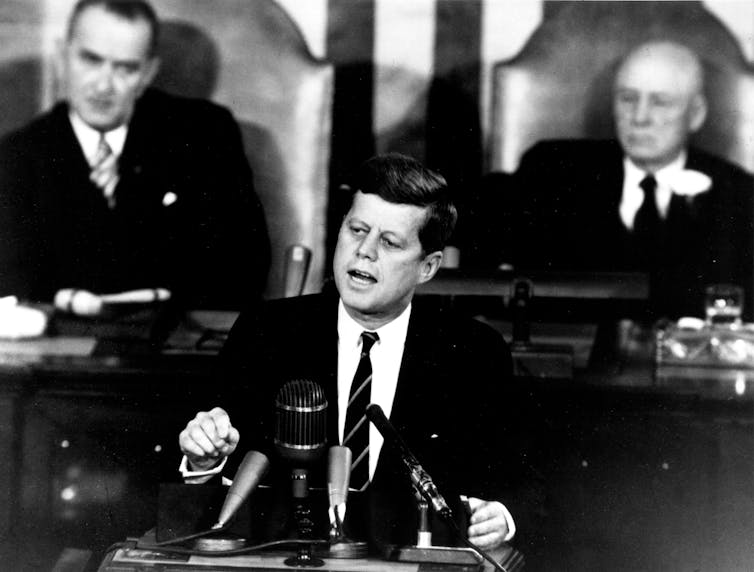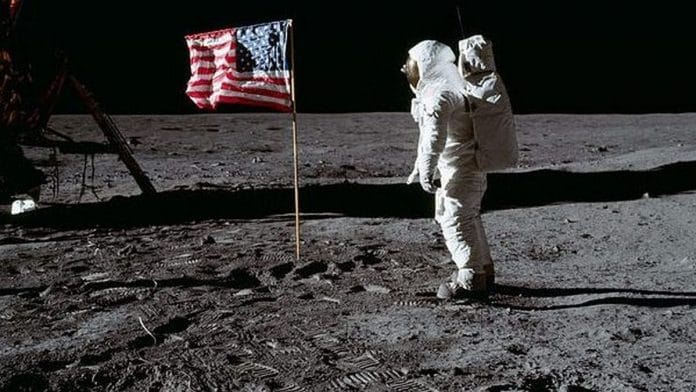The Apollo project gave us the astonishing spectacle of a blue marble rising over the sterile surface of the moon. Of course, the moon was already known to be uninhabitable. But being shown something in high-resolution colour photography makes a stronger impression than being told it by the experts. Our planet appeared in the photos as a small, vulnerable object amid surroundings utterly inimical to life. They showed, in a way that no scientific report could, the importance of keeping the Earth habitable, boosting the environmental movement.
But the moon landings affected many people in precisely the opposite way. No other public project has been such a spectacular success. The aim was so simple and concrete that everyone could immediately grasp it. Kennedy’s commitment to “landing a man on the moon and returning him safely to the Earth” was made before the US had even put a man into orbit. Yet it was achieved just eight years later – barely half the time it takes nowadays to build a new railway across London. “Top that,” the Americans can easily say. Fifty years on, no one has.
The trouble with spectacular successes is that they breed complacency. The moon landings reinforced the belief that technology will always be able to solve our problems. Everyone knows the saying, “If we can put a man on the moon, surely we can…” All we need is the will to do it. And a lot of money, of course. But not as much as you might think: the entire Apollo programme, over 12 years, cost about £120 billion in today’s money. That’s how much the US spends on its military in 11 weeks (and Britain in three years). If technology can do that, what can it not do?
This faith in technology has given us a false sense of security. Every day we hear urgent warnings about antibiotic resistance, soil depletion, deforestation, loss of biodiversity and of course climate change. These imminent catastrophes are the result of our own behaviour. The obvious solution is to change that behaviour: to stop abusing antibiotics, destroying tropical forests, burning fossil fuels, and so on. Yet we don’t.
Part of the reason we don’t is the expectation that technology will save us. If we can put a man on the moon, surely we can develop new antibiotics, replenish the soil and restore the tropical forests. We can stop climate change by building machines to remove greenhouse gases from the atmosphere. (And anyway, we can build walls to keep out the rising seas.) All we need is better politicians.
This sense of security is unwarranted. Technology cannot do everything. Once an ecosystem has been completely destroyed or a species has gone extinct, nothing can bring it back. No new Apollo programme will ever enable us to raise the dead after they have turned to dust. Some things are simply impossible – not for lack of money or technical know-how, but because of the laws of nature.
Political obstacles
And just as our sense of security overestimates the power of technology, it underestimates the political obstacles. It’s not just that large public science projects are out of fashion. The moon landings had the advantage of drawing on national pride: they served to demonstrate the superiority of the US over other countries – the Soviet Union in particular.

Combating antibiotic resistance, deforestation, and climate change, by contrast, requires all countries to work together. And these projects are unlike the moon landings in being essentially altruistic: one country’s expenditure benefits all inhabitants of the planet equally, whether or not they have contributed themselves. The selfish can get a free ride.
A further obstacle is that solving problems we have created for ourselves is not the sort of thing that easily inspires greatness. No one likes cleaning up after the party. It was easy to excite people about the first moon landing because it was such a great spectacle. We could watch it on TV in real time, from blast-off to splashdown. Like a good mini-series, it lasted just eight days. Averting catastrophe is not like that – especially when the problem cannot be shown in a simple stunning image.
Saving the planet doesn’t make compelling TV. There is no dramatic start or end point. And if the mission succeeds, the result will be only more of the same: the absence of catastrophe. What could be more boring? In democratic societies at least, addressing global problems will always be a hard sell. That’s why Kennedy’s contemporary heirs have done so little.
The success of the moon landings is no reason to expect technology to save us from ourselves. I fear it will make catastrophe more likely. Technology can help, but we need to know its limits. We’d be better off forgetting about rocketry and remembering the image of our planet as a tiny oasis in an inhospitable universe.![]()
Eric Olson, Professor of Philosophy, University of Sheffield
This article is republished from The Conversation under a Creative Commons license.
Also read: Aborted moon mission on front pages, Times Now, India TV ask why opposition oppose NIA Bill
![]()







Thanks to Hayabusa Mission ! Forget about repeated views on creater_ Grow UP